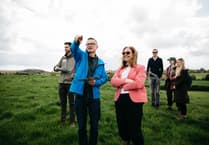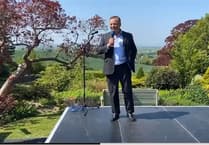PROTESTORS dressed as animals and trees descended on Bath to urge the local council to recognise legal rights of nature.
The Green group of councillors proposed a motion at the Bath and North East Somerset Council meeting to consider integrating "rights of nature" into decision making. Supporters, including Extinction Rebellion members, held a rally outside the Guildhall, dressed as birds, bees, and trees on Thursday, September 19.
Proposing the motion in the council meeting, Green group leader Joanna Wright (Lambridge, Green) said: “Rights of nature is not an abstract concept. In some parts of the world it already functions as a legal tool — the law recognises that nature deserves the same legal rights as people or corporations.”
In 2017, a river in New Zealand, Te Awa Tupua, was recognised as a legal entity with its own rights after a long campaign by Maori people. The Green group called for the council to resolve to write to the government about exploring similar ideas — and do what it could to protect nature under existing UK law.
Ms Wright said: “The council could appoint a sewage officer to monitor pollution and sewage spills using the environmental protection act to prosecute offenders and protect the River Avon.”
Just days after the meeting, Paul Powlesland, of Lawyers for Nature, who was among those to attend the protest outside the Guildhall, filmed a “plume of raw sewage” being discharged into a group of swans of the River Avon in Bath. Wessex Water said the brown discharge would “largely be rainwater.”
But in the council chamber, the Green motion was defeated, with just five votes in favour and 39 votes against and three abstentions. Ms Wright said she was “disappointed” with the outcome but said: “Hopefully, this motion will ignite new conversations across local government and help elected officials realise their powers to use existing UK laws to ensure a resilient future for both people and nature.”
Bath and North East Somerset Council was one of the first councils to declare a climate emergency in 2019 and was the first city in the country after London to bring in a clean air zone.
The council declared an ecological emergency in 2020 and introduced rules for new housing to increase biodiversity, even before national guidelines. It was recently ranked joint first in the UK for its efforts on biodiversity by Climate Scorecards.
-Sam-Ross-Saskia-Heijltjes-and-Joanna-Wright-and-(right)-P.jpeg?width=752&height=500&crop=752:500)




Comments
This article has no comments yet. Be the first to leave a comment.